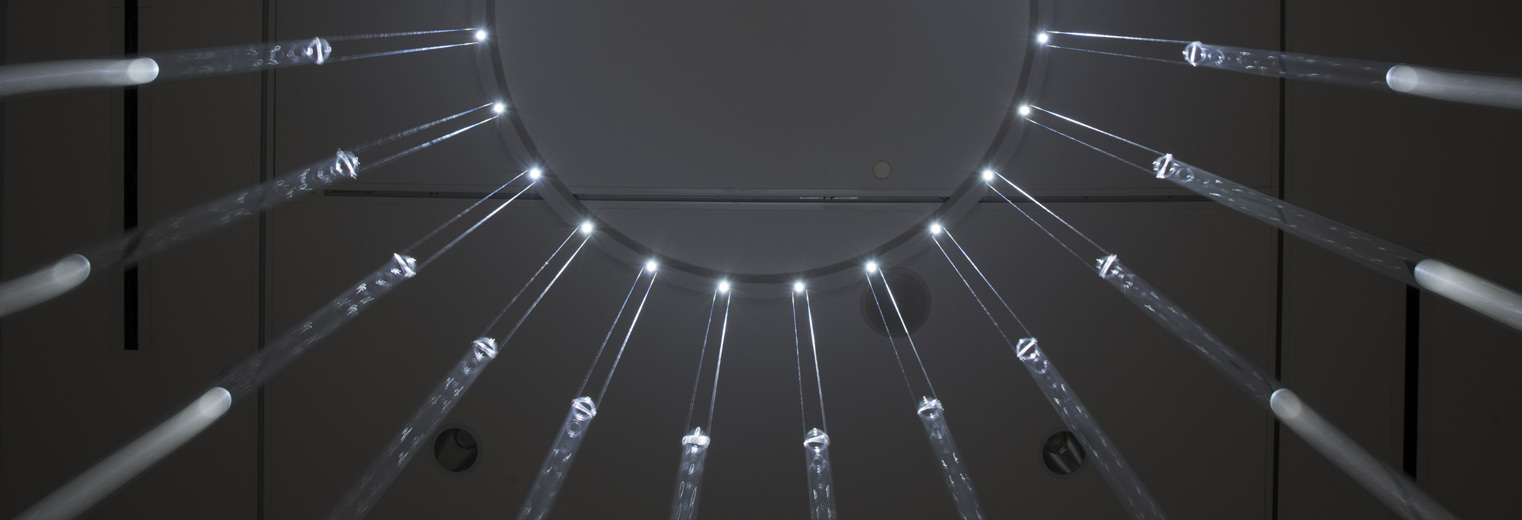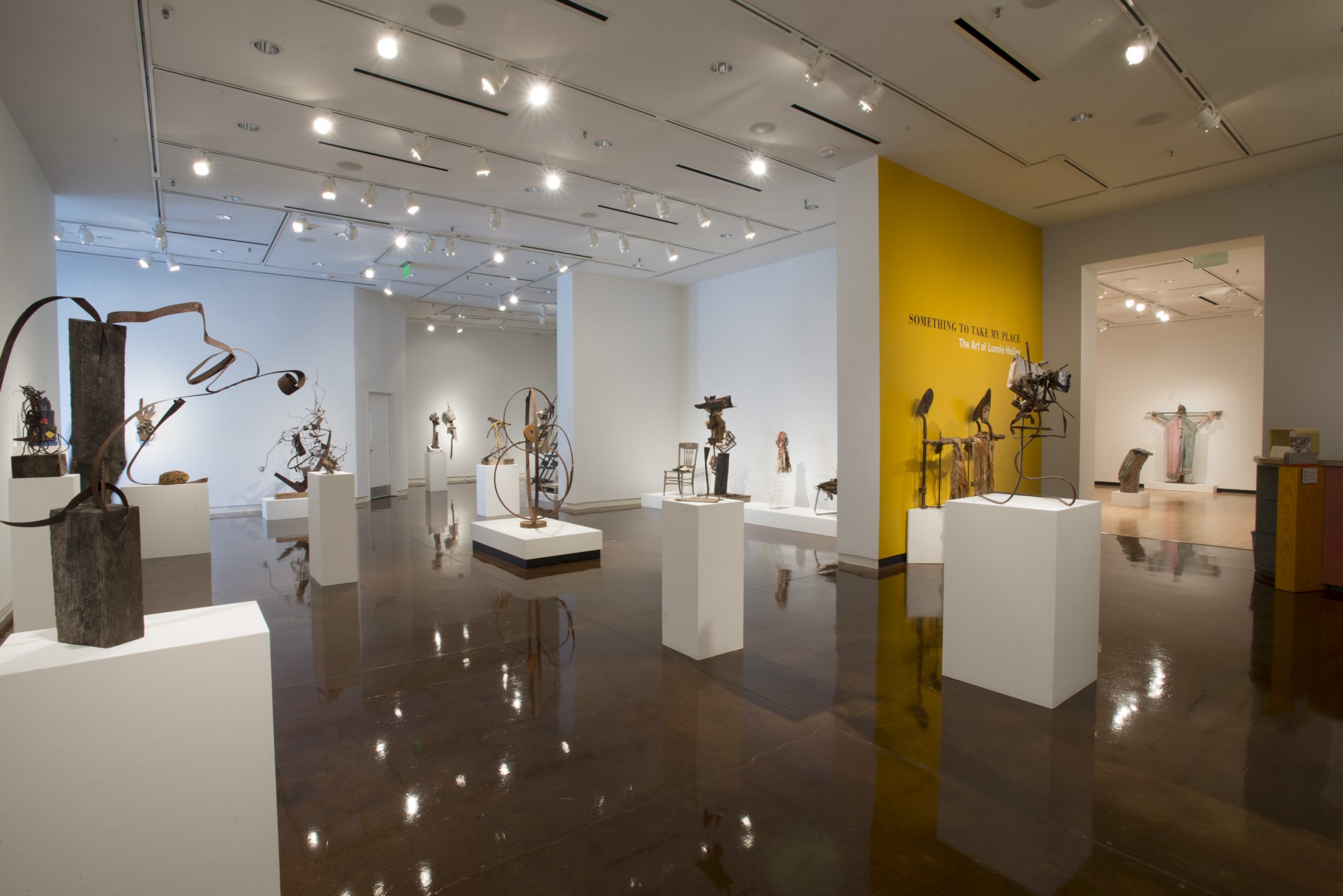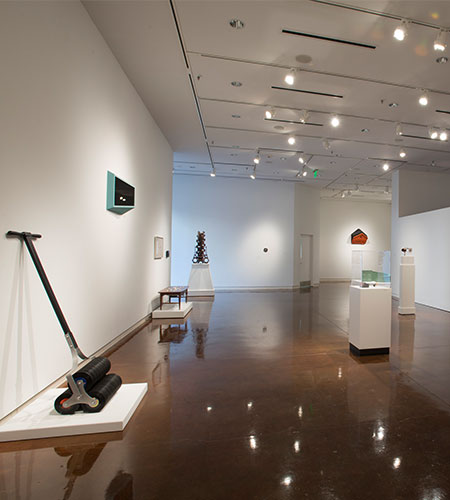

Housed within the School of the Arts at the College of Charleston, less than a block away from the busiest pedestrian intersection in the state, the Halsey Institute’s public facilities include two interlinked exhibition spaces totaling 3,200 square feet, the Joanna Foundation Video Cavern, a reference library, and archive. As a part of the College of Charleston, we interweave the intellectual capital around us into the fabric of our ongoing programming, working with faculty and international colleagues as guest curators, consultants, or advisors on specific projects. The Halsey Institute acts as a site of experiential learning for College of Charleston students and as a site of ongoing learning and expansion for our wider community.
The Halsey Institute was originally named the Halsey Gallery for the artist William Halsey, an accomplished Charleston native whose modernist works were exhibited at the Museum of Modern Art, the Whitney Museum of American Art, the Art Institute of Chicago, and the Metropolitan Museum of Art, to note a few. Halsey was the first individual to teach a studio art course at the College of Charleston beginning in 1964, and he continued to teach here for twenty years. Upon his retirement in 1984, the Studio Art faculty voted to name the art gallery after him to honor his contribution to the arts in Charleston. Mr. Halsey died in 1999.
Halsey’s wife, Corrie McCallum was also an accomplished artist. In addition to her vast body of work, Corrie McCallum made significant contributions to the Charleston art community as an educator. She was the first artist to teach printmaking at the College of Charleston. Under her guidance, the Gibbes Museum of Art conducted the first comprehensive art appreciation program for Charleston County public school students. She held education positions at several institutions, including the Telfair Museum of Art in Savannah and the Gibbes Museum of Art, College of Charleston, and Newberry College in South Carolina. Throughout her life, she remained an outspoken advocate for the visual arts. She died in 2009.
Since 1984, the gallery bearing the Halsey name has presented hundreds of exhibitions by regional, national, and international artists. In 2005, the gallery changed its name to the Halsey Institute of Contemporary Art to more accurately reflect the range of programming produced. Conceived as a non-collecting contemporary art facility, the Halsey Institute remains a vital cultural resource for the City of Charleston, the State of South Carolina and the region. The Halsey Institute hosts between three and five exhibitions per year, highlighting adventurous contemporary art by emerging and mid-career artists of national stature. All exhibitions are accompanied by extensive educational programming.
Dear Halsey Institute family,
Black Lives Matter. We write this letter because we believe that silence is violence. While the murders of George Floyd, Breonna Taylor, Tony McDade, and Ahmaud Arbery (to cite only the most recent public examples) are the impetus for recent protests and a larger spotlight on anti-Black violence, we must all acknowledge and work to dismantle the systemic racism at the core of our country’s institutions. We believe it is critical that we collectively and proactively facilitate difficult conversations that can help create action for a more equitable future.
While our heartache for the lives impacted by white supremacist systems reflects feelings rather than actions, we will continue to strive to be more proactive, inclusive, and reflexive. In addition to listening, learning, protesting, donating, and advocating as individuals, we are committing our organization to programming that will amplify conversations about systemic racism—and what we as a society can do to dismantle it.
In our new strategic plan, the College of Charleston collectively identifies and affirms our commitment to Core Values that include Diversity, Equity, and Inclusion. While our organization has been making strides to ensure equity and inclusion, we are not moving fast enough. We will push harder for change within the Halsey Institute, as well as our institutional host, the College of Charleston. Our ongoing commitment to an anti-racist framework is not only the morally correct thing to do, but also means that the Halsey Institute of Contemporary Art will be better fulfilling its mission.
We will:
The Halsey Institute is proud to support the work of Black artists and scholars. This work has helped to build the Halsey Institute’s reputation, and we acknowledge how we have benefited from Black creativity. We know the path forward requires us to look inward and strategize ways to diversify our partners, contractors, board, and staff to better reflect the community we’ve built together. We believe that art is a powerful vehicle for social justice and change, and we will continue to listen, learn, grow, and act, as individuals and as an organization. Countless organizations, community leaders, and advocates have been sharing anti-racism resources. To aid in the sharing of those resources, please click here.
In all of this, the Halsey Institute staff remains committed to listening to our community. At the College of Charleston, the impartial channel for reporting discrimination and harassment is the Office of Equal Opportunity and Programs, which can be reached at (843) 953-5754 or eop@cofc.edu. We are committed to the work necessary and look forward to the day when we all share in an equitable world.
In sincere appreciation,
Halsey Institute staff
We originate a variety of exhibitions every year, many of which travel nationally, and host a year-round schedule of lectures, panels, symposia, screenings, discussions, and special events. We also produce video documentaries about the artists and exhibitions that we originate. These videos provide keys to understanding the artist’s creative process and are permanently archived on our comprehensive website. We also produce award-winning publications for many of our exhibitions. These catalogues feature thoughtful commissioned essays that provide a meaningful context for the exhibitions and offer a permanent record of the artist’s project with the Halsey Institute. Our emphasis has long been on providing audiences with privileged access to the creative process itself. We enjoy sharing our belief that there is much that can be learned by seeing how an artist turns “a thought into a thing.” Charleston, South Carolina has a remarkable history as a port city and cultural crossroads. The Halsey Institute is committed to building on and exploring the complex and sometimes troubling history of this place through diverse exhibitions and an international artist-in-residence program. To find out our current and upcoming exhibitions, click here.

Located on the first floor of The Marion and Wayland H. Cato Jr. Center for the Arts at the College of Charleston, the Halsey Institute occupies two interlinked gallery spaces, a dedicated media room, and a library/resource area.
The Halsey Institute of Contemporary Art recognizes and acknowledges that our museum spaces are on the lands of the Edisto Natchez-Kusso and Yamassee Indigenous communities. We have a responsibility to acknowledge that the College of Charleston and its buildings were built on Indigenous land with enslaved labor. These lands were the traditional territories of these Native Nations prior to their forced removal and continue to carry the stories of these Nations and their contemporary struggles for survival and identity. Today, this place is still home to many Indigenous people from across the world. It is our responsibility as College of Charleston community members and residents of the Charleston area to recognize the ever-present systemic inequities that stem directly from past wrongdoings and the ongoing process of colonization and commit ourselves indefinitely to respecting and reconciling this long history of injustice.
The Halsey Institute has been supported by a variety of private and public funders over the years, including: Andy Warhol Foundation for the Visual Arts, Asian Cultural Council, Bishop Family Foundation, Coastal Community Foundation of South Carolina, Elizabeth Firestone Graham Foundation, E. Rhodes and Leona B. Carpenter Foundation, Furthermore: a program of the J.M. Kaplan Fund, Graham Foundation, Harpo Foundation, Henry Luce Foundation, Henry and Sylvia Yaschik Foundation, Japan Foundation, Joanna Foundation, South Carolina Arts Commission, National Endowment for the Arts, and NASA.
We are particularly grateful to receive on-going support from the Gaylord and Dorothy Donnelley Foundation’s Lowcountry Artistic Vitality grants, and advertising support from the City of Charleston, Charleston County, and The Town of Mt. Pleasant.
In addition to grant funding and the funding from the College of Charleston, we sustain our dynamic programming with the encouragement and support of our Members and Community Partners–those who keep the mighty Halsey afloat. The cash and in-kind donations from these individuals, businesses, and organizations afford us the ability to maintain free programming for the community. Members and Community Partners enjoy a variety of stratified perks. Each year, we offer a new set of limited edition prints available exclusively to our Patron members. Artists who have been a part of the Halsey Institute’s programming have specially created these prints for us. Beginning at the Conceptualist level ($500), Members may choose from one of the prints we have available. To find out more about our Membership and Community Partners programs, click here.
Tours are led by experienced guides and can be adapted to follow specific content or course objectives as well as geared towards any age. Our discussion-based tours help students learn how to look closely, think critically, and engage with concepts and ideas related to art and their personal experiences. Through group conversations, students learn about the objects in the exhibition and also gain an understanding of the context for the work and related themes and ideas.
Click here to learn more!
The Halsey Institute has a reference library that is open to the public for browsing. The space contains exhibition catalogues, art history books, artist monographs, rare books and books on uncommon topics. This is a non-lending library that offers a cornucopia of inspiration for those interested in visual culture. Click here to browse the catalog online.
 The Art*O*Mat is a repurposed cigarette vending machine converted to sell art. The mission of Artists-in-Cellophane (A.I.C.), the sponsoring organization of Art*O*Mat ®, is to encourage art consumption by combining the worlds of art and commerce in an innovative form. With roughly 400 contributing artists from 10 different countries, A.I.C. has created an opportunity to purchase original artwork while providing exposure and promotional support for the artists. A.I.C.’s belief is that art should be progressive, yet personal and approachable. What better way to do this than with a heavy cold steel machine? Wouldn’t you like to see your own work in our machine?
The Art*O*Mat is a repurposed cigarette vending machine converted to sell art. The mission of Artists-in-Cellophane (A.I.C.), the sponsoring organization of Art*O*Mat ®, is to encourage art consumption by combining the worlds of art and commerce in an innovative form. With roughly 400 contributing artists from 10 different countries, A.I.C. has created an opportunity to purchase original artwork while providing exposure and promotional support for the artists. A.I.C.’s belief is that art should be progressive, yet personal and approachable. What better way to do this than with a heavy cold steel machine? Wouldn’t you like to see your own work in our machine?
Check out this great video on the Art*O*Mat by UNC TV here and visit artomat.org to learn more!
Photographers from the Halsey Institute often document events. Your photograph might be taken and used by the Halsey Institute in a non-profit, educational, news-related, and/or editorial purposes. Images could appear in print or digital media, and may be posted online.
The Halsey Institute exhibitions program is not built off of unsolicited submissions, but we do appreciate learning about new work and expanding artist networks. The Institute staff recognizes the time and effort many artists put into compiling submissions and we know how difficult it can be to have your work seen. You are welcome to email your exhibition proposal to halsey@cofc.edu, where we look at each submission we receive. Due to the volume of submissions, we are not always able to reply personally to each submission, but please know it is received and appreciated.
The Halsey Institute is not responsible for any physical materials mailed to our museum, and they will not be returned. Please, no calls or walk-ins. We will be in touch if we have a project in mind. Thank you for your interest in our program.
